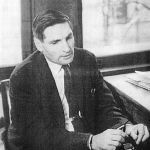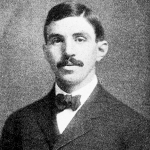Background
Joseph Fels Ritt was born on August 23, 1893, in New York, New York, the Son of Morris and Eva (Steinberg) Ritt.

Columbia University, New York City, New York, United States
Ritt received the Ph.D. from Columbia University in 1917 for his work on linear homogeneous differential operators with constant coefficients.
City College of New York, New York City, New York, United States
From 1908 to 1910 Ritt studied at City College of New York.
George Washington University, Washington, D.C., United States
After two years of study at the College of the City of New York, Ritt obtained the Bachelor of Arts degree from George Washington University in 1913.






Joseph Fels Ritt was born on August 23, 1893, in New York, New York, the Son of Morris and Eva (Steinberg) Ritt.
After two years of study at the College of the City of New York, Ritt obtained the Bachelor of Arts degree from George Washington University in 1913. He received the Ph.D. from Columbia University in 1917 for his work on linear homogeneous differential operators with constant coefficients.
Ritt joined the Columbia faculty in 1921 and served as department chair from 1942 to 1945, and in 1945 became the Davies Professor of Mathematics. He was colloquium lecturer of the American Mathematical Society (1932), a member of the National Academy of Sciences, and vice-president of the American Mathematical Society from 1938 to 1940.
Ritt’s early work was highly classical. Papers entitled “On Algebraic Functions Which Can Be Expressed in Terms of Radicals,” “Permutable Rational Functions,” and “Periodic Functions With a Multiplication Theorem” were the. result of a thorough study of classic masters. His work on elementary functions took its inspiration directly from Liouville.
Contributions to algebraic differential equations and algebraic difference equations were made by many of Ritt’s students after 1932, in particular, by E. R. Kolchin, W. Strodt, H. W. Raudenbush, and H. Levi. Differential algebra, a new branch of modern algebra, also owes much to these early researches.
Ritt's major achievement was in founding the differential algebra theory, which was developed by him and his student Ellis Kolchin. He also is known for his work on characterizing the indefinite integrals that can be solved in closed form, for his work on the theory of ordinary differential equations and partial differential equations, for beginning the study of differential algebraic groups, and for the method of characteristic sets used in the solution of systems of polynomial equations.
He was honored with a Doctorate in Science granted by George Washington University in 1932 and was elected to join the United States National Academy of Sciences in 1933.
Ritt investigated the algebraic aspects of the theory of differential equations, considering differential polynomials or forms in the unknown functions y1 ,…, yn. and their derivatives with coefficients that are functions meromorphic in some domain. Given a system σ of such forms, he shows that there exists a finite subsystem of σ having the same set of solutions as σ. Furthermore, if a form G vanishes for every solution of the system of forms H1 ,…, Hr , then some power of G is a linear combination of the Hi and their derivatives. These arguments lead to the statement that every infinite system of forms has a finite basis.
In considering reducibility Ritt concluded that the perfect differential ideal generated by a system of forms equals the intersection of the prime ideals associated with its irreducible components. The purpose of this work was to advance knowledge of “general” and “singular” solutions, which in the preceding literature (Laplace, Lagrange, and Poisson, for example) had been very unsatisfactory.
Ritt was elected a member of the United States National Academy of Sciences. He was also a member of the American Mathematics Society (vice president 1938-1940).
Ritt married Estelle Fine on June 29, 1928.

April 18, 1916 – October 30, 1991, an American mathematician at Columbia University. Kolchin earned a doctorate in mathematics from Columbia University in 1941 under supervision of Joseph Ritt. He was awarded a Guggenheim Fellowship in 1954 and 1961. Kolchin worked on differential algebra and its relation to differential equations, and founded the modern theory of linear algebraic groups. His doctoral students include Azriel Rosenfeld and Irving Adler.

April 2, 1878 – January 7, 1955, a prominent American mathematician who was appointed Tutor on Mathematics in the Columbia University Mathematics Department.
